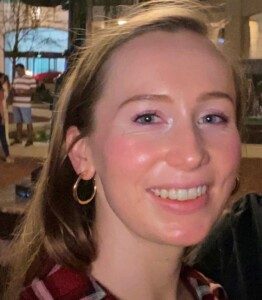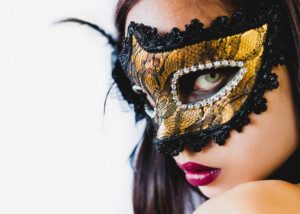Ashley’s heavy autistic masking since childhood has shielded her true authentic self even from her own parents. She explains how this dual life works.
Some autistic people, particularly females, develop a fake persona in an effort to fit in and not be regarded as an oddball.
Some become so prolific at this that they pass as totally neurotypical (NT) – not even quirky neurotypical.
This masking involves concealing autistic traits as well as tacking on NT behaviors plus sometimes a variety of common mannerisms.
Ashley Gartner was diagnosed with autism at 24. But since early childhood she has masked – heavily and deeply, to integrate with a neurotypical-dominated world.
Ashley is a master esthetician who has a holistic skincare blog.
Below she answers my questions about her autistic masking.
What age did you discover masking?
I’ve always mimicked people. I would mimic what other people would do on television and in movies ever since I was very little, around 3-4 years old.
I would also mimic other people in my life if I thought what they were doing was “cool.”
In sixth grade was when I really started changing my personality, though.
I had an uncommon school experience. I went to a private Catholic school. It was K-8th grade. There were around 400 people in total in the whole school.
I could get along fine in elementary school, but when sixth grade began, my class spilt into cliques.
I didn’t want to be a part of the unpopular group, because I knew I would be ridiculed and made fun of, so I masked to be a part of the popular clique.
How did you discover masking?
I saw the unpopular people in my class being a target. The popular kids would say mean things about them and be very judgmental, rude, etc.
I didn’t want that to happen to me, so I acted like a popular kid and became part of their group.
How did you hone your masking skills?
I really just copied my friends at the time who were very bad influences.
I would just do whatever they did, but after two years of this, my teachers would keep pulling me aside and telling me that this wasn’t me and I’m better than that.
They knew my friends were going down a bad path and knew I wasn’t supposed to end up like them.
In high school I wasn’t popular, but I had some friends. I would watch movies and videos and try to act like the people I watched.
For small-talk responses, I just copy what I hear other people say.
What specific masking behaviors did you become really good at?
I became good at seeming really engaged when people speak. I became overly expressive.
Was your mask an embellishment of your personality or was it a completely different personality in which, for example, you outright faked interests in various topics and even changed your voice just so that kids/adults could enjoy mingling with you?
Oh yes, it’s a completely different personality. I get a very high voice when I mask and have to change my expressions and everything.
It’s become something I involuntary turn on when I have to interact with people I am uncomfortable with or don’t know well.
As you get to know someone better, does the mask gradually fade somewhat, ever?
I think it depends on the person. When I met my partner I felt instantly connected, like I knew him forever, so I didn’t have to mask for long at all.
With other people I mask forever, and with others I drop it a little bit after getting to know them more and feeling safer.
And has the other person ever noticed this dropping and hence, alteration in your persona?
In my past friendships, my friends would say that I was very “quiet” at first, and I was different from what they expected I would be once they got to know me.
But most of the time people won’t see my mask come off, and they won’t notice an alteration in my personality.
Have you ever explored the idea of just thinking, “Screw what people think; I’m being myself from now on, and if they think I’m weird or autistic, so what. MY feelings and MY comfort are more important than people who don’t have a special place in my heart.
Of course! But unfortunately it is not so simple. Masking became an involuntary part of me.
I’m sure therapy would be beneficial in figuring out how to fully unmask.
It’s unfortunately not a switch I am able to turn off whenever I want to, but I am very slowly experimenting and figuring out how to unmask on my own for now.
Were there environments where you intentionally dropped the mask completely or almost completely?
I never intentionally dropped my mask because it’s involuntary. I could unmask around my family until I began college.
Now the only person I can completely unmask with is my partner.
Does this mean your parents and siblings have no idea that when they’re with you, you’re not being “you”? How might they feel if, without telling them, you managed to drop the mask?
I am able to talk more freely to my sister, and she is supportive and accepting of me.
She can kind of tell when I am masking or not. I do not really mask with her, but sometimes I do.
I’m not sure if I could ever fully unmask with my parents, and I am not sure what they would think if I ever did. That is a tricky one.
Do you plan on one day informing them that the Ashley they know is not actually you?
As of now, I do not, but maybe one day.
Do you believe that your “autistic self” would cause others to be terse with you and even angry?
Yes, I do.
HAVE you ever been yelled at or treated really bad during times your mask slipped, especially in adulthood?
Or, are you simply being pre-emptive about it and these terse treatments never really happened?
In the past when I was being authentically me I would get in trouble and have no clue why.
In elementary school I would get in trouble a lot (I still don’t know why for the majority of things).
I often had to sit out a recess and I would get a lot of warnings and a couple letters sent home.
None of what I did had any bad intentions, but by the third grade I just learned to be silent and act very obedient so that I wouldn’t get in trouble anymore.
I think I just care too much about what other people think. I fawn to avoid conflict because I hate confrontation and being yelled at.
I also hate being judged. If I mask my personality then people don’t really get mad at me and I avoid conflict.
Have you heard of that saying, “What other people think of you is none of your business”? Have you thought about working on putting your feelings first? Girls are taught to be nice and compliant. This can lead to heavy masking.
Yes I have! It will definitely take a lot of work on myself and professional help to unlearn everything, but I know one day it will happen!
Have you ever wondered about the effectiveness of a “one small bite at a time” approach to learning to unmask? It might mean unmask only the tone of your voice – for 30 days, while continuing to mask in other areas. Once your authentic voice becomes automatic, drop another masked element, and so on, over a course of many months, and before you know it, your mask consists of only one feature (e.g., forced smiling).
Yes I have heard of that! And I do think that is a great approach to so many things in life, including unmasking because like you said it’s so overwhelming to try to do something all at once.
Do you anticipate eventually experiencing the “autistic burnout,” in which lifelong masking finally catches up to you?
Now that I know I’m autistic, I’ve withdrawn from a lot of social situations because I get so drained and anxious.
I’ve always felt this way in most social situations, but before I knew I was autistic I would just push myself through them. Now I’m trying to be more gentle towards myself and understand what my limits are.
If your parents read this Q & A, would they be heartbroken, realizing that the daughter they have loved for 20+ years is “not really their daughter”?
I don’t feel like they would be heartbroken. I also think it will take a very long time to fully unmask, so gradually my authentic self will come out and won’t be shocking to them.
Like most people, I’ve grown and changed in so many different ways over the years.
I’m not the same person I was even a year ago and this will keep changing all the time, so I feel like from an outsider’s perspective, it may look like I’m just changing with time.
What advice do you have for parents of young kids – who are socially awkward, seem to be misfits or tend to rub their classmates or teachers the wrong way – so that those kids will always feel at ease being their true authentic selves around their parents instead of cultivating what will eventually be a thick permanent mask?
I think a very important thing parents can do is to let their kids know that their quirks, unique ways of thinking, and other “misfit” traits should be a positive thing.
There is nothing “wrong” with them. They are not “too much.” It’s simply whom they are and what makes them unique and special.
They are perfect just the way they are and no one should tell them they need to change or “fit in.”
I also think it’s important for parents to listen to their children and accommodate them so that they can thrive.
 Ashley Gartner runs Ash Esthetics, a holistic skincare site where she shares her expertise in skincare, a passion she’s had since age 12. “I was determined to learn everything there is to know about skin,” says Ashley, who’s licensed as a master esthetician. “My main goal is to just help people because I know how hard it is to have healthy skin.”
Ashley Gartner runs Ash Esthetics, a holistic skincare site where she shares her expertise in skincare, a passion she’s had since age 12. “I was determined to learn everything there is to know about skin,” says Ashley, who’s licensed as a master esthetician. “My main goal is to just help people because I know how hard it is to have healthy skin.”
 Lorra Garrick is a former personal trainer certified by the American Council on Exercise. At Bally Total Fitness she trained clients of all ages for fat loss, muscle building, fitness and improved health.
Lorra Garrick is a former personal trainer certified by the American Council on Exercise. At Bally Total Fitness she trained clients of all ages for fat loss, muscle building, fitness and improved health.
.



























